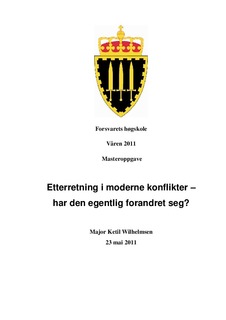| dc.description.abstract | This thesis explores the evolution of intelligence moving from the Cold War paradigm to the new modern conflict paradigm we can see in Afghanistan today. After the end of the Cold War, intelligence found itself in a vacuum. With the intervention of western forces in the Gulf and on the Balkans in the early 1990’s, intelligence support was again demanded. The demand for, and focus on, intelligence increased even further with the terrorist attacks in 2001, with the following interventions in Afghanistan and Iraq. The overall focus of this thesis answers the following questions: “Has military intelligence as an activity changed or not after the Cold War was followed by a new international conflict pattern? What can explain the possible changes or continuity?” The focus is narrowed down to analyse it from a Norwegian perspective. All findings in this thesis indicate a rational explanation to the changes. The new paradigm with new needs has been the trigger for rather extensive changes within intelligence in Norway. Every change is done in order to enable better decision making. Only within one aspect continuity is found. There has always been, and will always be, a need for secrecy concerning intelligence’s capabilities, methods and sources. | en_US |
